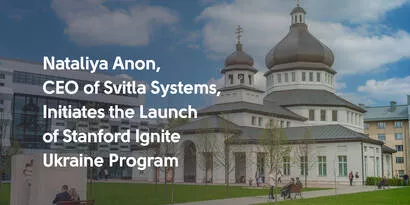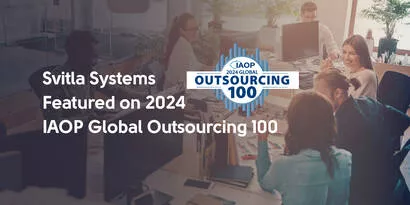
Transcript of Interview with Nataliya Anon, CEO and Founder of Svitla Systems, Inc.
Transcript of Interview conducted by the Free COO, Donald Landwirth in May, 2012 with Nataliya Anon, CEO and Founder, Svitla Systems, Inc.
DL: Nataliya, you have 2 Master Degrees. Not many people have that. How did you get them?
NA: When I came to the United States, I got my first Master Degree from the University of Kansas; it was Masters in accounting and information systems Then I worked for Ernst and Young for several years, but always had in mind that I would like to start a business and business school was always on my horizon. I applied to Stanford, got accepted and received my MBA degree in 2001.
While at Stanford, it was a wonderful experience to be in the mix of people from all over the world, from different backgrounds and age categories, and have an opportunity to learn from amazing professors and speakers who were invited to our classes. Our class was privileged to have Warren Buffett as a guest speaker in our investments class. The Stanford network is really strong.
When I studied in Moscow, the Berlin Wall just came down and I was one of the first few students who had a chance to come to the US to study. When I was growing in the Soviet Union, it was easier to imagine that I would become an astronaut one day and fly to Mars then I would come to the United States. I still remember the day when I came to the immigration officer in the US, presented my papers and he asked: “You’re going.. where? Kansas? … to study… what? accounting?” At that point, I thought maybe I was doing something that that was not quite right. But in fact my experience in Kansas was wonderful: people were very friendly and I got an excellent education.
DL: Nataliya, I have known you for almost 5 years, from Inflection company, thank you for the great service, great teamwork, it’s been really a pleasure to work with you and your team. How did you start doing your own business?
NA: The concept of an outsourcing company was an easy idea because India by that time in 2001 has already been on the market for about 10 years, it was already an established industry growing rapidly. I was keeping my connections in Ukraine and knew that there were great technical talents while in Silicon Valley there was a shortage of these talents (they are expensive and hard to find), so it became very easy for me to make that connection and to start a business.
DL: Are you a programmer? Did you study programming and computer science?
NA: No, I’m mostly a business person, finance, accounting, business development are my specialties. But I have been in this industry for quite a while, and I have learned how to communicate with great technical people.
DL: What made you think IT? Maybe you should start a hedge fund or consulting…
NA: I was in the midst of the “soup” of the Silicon Valley and being exposed to different entrepreneurs and ideas, speakers who were coming to the Business School at Stanford, network of my friends, and they all were in IT industry. To come up with an idea to use great technical talents from Ukraine was an easy way to start a company.
DL: Did you start your company after studying at the University of Kansas?
NA: No, I worked for Ernst and Young, I was in the international tax consulting group, I was with E& Y in New York and then London, doing quantitative tax calculations for multi-national companies. In From London, I applied to several business schools whereas Stanford was my top choice. I got accepted and moved to California.
DL: So, you went to Stanford and decided to start your own business and your first one was Lohika. What area of IT did you decide to go?
NA: Yes, Lohika in Ukrainian means “logic”. It was a venture-funded business, which I started in 2001, it was a very tough year, but the concept was good, we had a good business plan and were a fortune to raise funding. Again, the idea was to work with technical talents from Ukraine to deliver development and testing services to US companies. We had strong technical people in the US, front-end for the service, they were dealing with customers and a back-end development work was carried out in Ukraine. I remember those times when it was hard to sell. Right now, you do not have to sell the concept of outsourcing. Entrepreneurs, who start a business, say: “We are going to outsource”. Now it is much easier to bring a developer to a customer site, they can stay here for a month-two-three. Skype is a great tool to be connected.
DL: Is Lohika still in business?
NA: I exit the company after 2 years being there, the company is still around and going strong.
DL: Why did you leave and start Svitla?
NA: There were differences in vision on the management team and also I wanted to try to start a product company. I then started a company where were developing a solution to protect CDs and DVDs from pirate copying. Unfortunately, that company did not go very far. In parallel, I started my third company, Svitla, which I bootstrapped and I returned to a service model. What was different? No venture funding, only organic growth. People, who interacted with a customer, were highly qualified team leads and developers; they understood the requirements and went on daily meetings and led the engagements with the customer.
DL: Are there 2-3 key tips you can give to the entrepreneurs what it takes to start a company?
NA: I think the major tip is perseverance. It’s so difficult to start a company, things always go wrong, it always takes more time, more money than you predicted. Obviously, you have to listen to your customers and revisit to your assumptions, so that you are not hitting against the wall. It is hard, but it gets easier.
DL: What is the main difference between venture- funded and bootstrapped companies? If you had to do another company, which way did you go?
NA: For the services business, I would go the bootstrap- way, just like Svitla, because you do not need much capital to start a company. As soon as you get a customer, you get cash flow and can finance your operations and go to the next level. For a product company, you have to go for venture funding because it allows growing faster. It is also a choice for entrepreneur how fast you want to grow, which model you want to choose, which one fits better your personality and your lifestyle.
DL: What should the company think of when it is going to outsource?
NA: Obviously, the thinking should be what is your core business and what is not. Start-ups usually build their core business in-house. When they have a need to scale up and do it fast, they start thinking about outsourcing. Our developers become part of an in-house team, they participate in daily meetings and this is a way of expanding startup’s core team. Sometimes start-ups would like to outsource the whole development cycle: from graphic design to system administration.
DL: What is the difference between hiring people in-house and remote outsourcing team in that case?
NA: When you hire people in the US, you hire employees. When you sign the contract with an outsourcing company, the outsourcing company itself is dealing with its employees and you do not have to think about all related HR and infrastructure issues.
DL: There are so many countries that propose outsourcing services for the clients: India, China, Argentina etc. What country should man think of when he makes a decision to outsource?
NA: What differentiates Ukraine on the map of all outsourcing companies is its great technical talents. I am proud when I am talking about that. I heard so many times from many customers that we have strong technical people, who can think out-of-the-box, come up with ideas and suggest things. The time difference is not a problem: with our teams, customers have 24 hours working day. When Ukrainian team has almost finished their work day, customers wake up, do their daily meetings with the team, and then Ukrainian developers go to sleep, and customers check what was done, do their work, think about strategy and plans for the next day, send them off To Ukraine and go to sleep. Then the Ukrainian team wakes up and here is the 24-hour cycle.
DL: How do you work for Inflection?
NA: We started from one developer, who came to the US and had interaction with the team in the US, understood the requirements and went back to Ukraine to establish the team there. In a year, we had 20 developers on the engagement and we have been working for 6 years with Inflection. In fact, it is my favorite customer. They treat our team as an internal part of their team.
DL: How does Svitla compare to Odesk, Elance or other similar companies?
NA: Such websites are usually for renting a developer when you need one developer to get a job done. In Svitla case, you deal with a company, with the whole number of services from UI, graphic design and development until deploying a complete application.
DL: I know that technical resumes are rarely well prepared. They are full of anachronisms and never tell the level of developer. How do you deal with that?
NA: We have created a convenient format of resumes. Our HR department fills out a table where you can find not only the list of technologies but also the level from beginner to expert. This approach helps our customers to understand the skills clearly.
DL: What are trends of software development?
NA: Lately Ruby on Rails allows our start-up customers to develop prototypes quickly; also, PHP with Zend Framework is a scalable tool. We ask the right questions at the beginning of the project to know which technology will fit best.
DL: Why do you think your developers are so tremendous talented?
NA: There was such a heavy emphasis on math, physics, and statistics that Ukraine inherited from the Soviet-time school, that creates a special kind of engineers. I don’t think that there is some secret in the water or in the air, it’s just a hard work!
DL: Thank you for being here and sharing your experience.
Translation of the interview aired on Free COO aired on May 8, 2012 completed by Svitla PR team.
Let's discuss your project
We look forward to learning more and consulting you about your product idea or helping you find the right solution for an existing project.
Your message is received. Svitla's sales manager of your region will contact you to discuss how we could be helpful.




